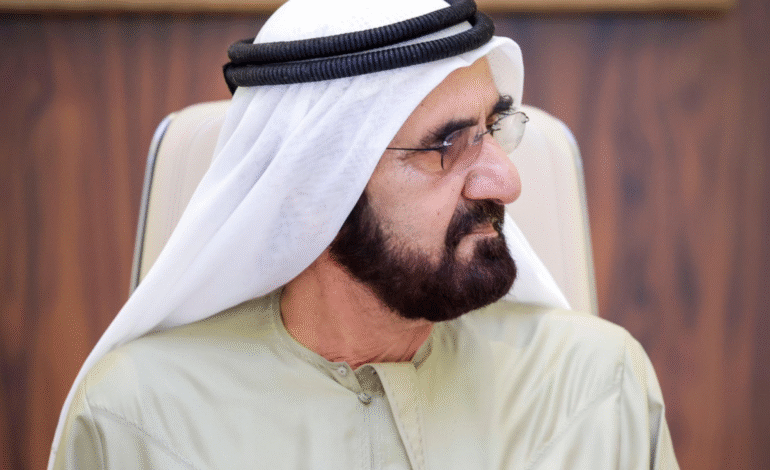UAE Restructures Government: New Foreign Trade Ministry, AI Joins Cabinet

His Highness Sheikh Mohammed bin Rashid Al Maktoum, Ruler of Dubai, announced major changes in the UAE government structure. These updates came after consultation with His Highness Sheikh Mohamed bin Zayed Al Nahyan, President of the UAE. Sheikh Mohammed revealed these decisions in an official post on X (formerly Twitter), underscoring the leadership’s vision of a modern, efficient, and future-ready government.
UAE Forms Ministry of Foreign Trade to Boost Global Ties
Sheikh Mohammed announced the creation of the Ministry of Foreign Trade. The ministry will strengthen the UAE’s position in global markets and deepen trade partnerships. Dr. Thani Al Zeyoudi was appointed as Minister of Foreign Trade, reflecting confidence in his experience in international trade and sustainability. The new ministry will focus on developing trade agreements, boosting exports, and creating frameworks to attract investments. The UAE aims to enhance its competitiveness in an evolving global economy through this dedicated ministry.
Ministry of Economy Renamed to Embrace Tourism’s Role
In a move highlighting tourism’s growing economic importance, the Ministry of Economy has been renamed to the Ministry of Economy and Tourism. This change reflects the UAE’s strategy to diversify income sources beyond oil and gas. Tourism plays a vital role in national development plans. Abdullah bin Touq Al Marri will continue to lead the ministry, now tasked with integrating tourism policies to support sustainable economic growth. The new structure aims to create stronger links between economic development and the tourism sector, enhancing the UAE’s global appeal as a destination for both business and leisure.
Artificial Intelligence Gains Formal Role in UAE Governance
Sheikh Mohammed announced that the National Artificial Intelligence System will become an advisory member of the UAE Cabinet starting in January 2026. This AI system will participate in Cabinet sessions, the Ministerial Council for Development, and the boards of all federal entities and government-owned companies. Its role is to support decision-making with real-time analysis, technical advice, and data-driven recommendations. This pioneering move aims to enhance the efficiency and effectiveness of policies across all sectors, including healthcare, education, energy, and infrastructure.
Strategic Vision Behind the Government Reforms
The reforms reflect the UAE’s strategic vision to create a government that is adaptive, innovative, and globally competitive. The Ministry of Foreign Trade will focus on navigating complex global markets and enhancing the UAE’s international trade footprint. The Ministry of Economy and Tourism will ensure better alignment between economic policy and tourism development. By integrating artificial intelligence into governance, the UAE sets a global benchmark for using advanced technology to inform public administration.
Business and Public Reactions to the Changes
The UAE’s business community welcomed the creation of the Ministry of Foreign Trade as a step that will unlock new trade and investment opportunities. Tourism leaders praised the recognition of their sector’s contribution to the national economy. Technology experts applauded the integration of AI into decision-making processes, noting that it positions the UAE as a trailblazer in tech-driven governance. On social media, citizens expressed confidence in the reforms, describing them as bold and future-oriented steps that will strengthen the country’s global standing.
UAE’s Track Record of Innovative Government Restructuring
The UAE has consistently reshaped its government to meet emerging challenges and seize new opportunities. Past initiatives include the creation of ministries dedicated to artificial intelligence, happiness, and tolerance. These moves reflect a governance model that values innovation, agility, and inclusivity. The latest reforms continue this tradition, aligning government structures with national priorities and global trends.
The Role of Ministers in Advancing the UAE Vision
Dr. Thani Al Zeyoudi, as Minister of Foreign Trade, brings deep experience in advancing the UAE’s global trade interests. He is expected to lead efforts that promote sustainable growth and secure new markets. Abdullah bin Touq Al Marri will continue to drive economic reform while integrating tourism as a key pillar of national development. Their leadership is crucial for achieving the ambitious goals outlined in the new government structure.
Artificial Intelligence as a Game-Changer for Governance
The inclusion of artificial intelligence as an advisory member of the Cabinet marks a historic step in modern governance. From January 2026, AI will provide ministers with real-time insights, predictive analysis, and technical recommendations. This will help speed up decisions, improve accuracy, and ensure that policies are based on evidence. The UAE aims to create a more efficient and responsive government that can adapt to fast-changing global conditions.
Expected Impact on Economy and Policy
These reforms are expected to bring lasting benefits. The Ministry of Foreign Trade will help the UAE secure stronger trade agreements and increase its share in global markets. The Ministry of Economy and Tourism will promote integrated strategies that support both economic growth and the tourism sector’s development. The use of artificial intelligence will improve policy quality, implementation, and evaluation, reinforcing the UAE’s position as a leader in future-ready governance.







